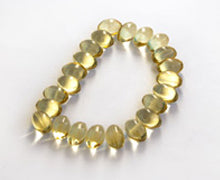
There are some people who avoid sun exposure, even though it’s a great source of vitamin D, which can protect you from skin cancer, for fear of getting skin cancer. Fortunately, there is more than one way to boost your vitamin D intake. A new study from the University of Eastern Finland and Kuopio University Hospital found those who regularly took vitamin D supplements had fewer cases of melanoma and had a considerably lower risk of developing this type of skin cancer.
Vitamin D impacts many aspects of human health and has been shown in other studies to protect the body from skin cancer. This study was designed to compare oral vitamin D consumption to the rates of cancer in those at an increased risk of developing the disease.
The study consisted of 498 patients who were estimated by dermatologists to have an increased risk of skin cancer such as basal cell carcinoma, squamous cell carcinoma or melanoma. Melanoma is the most aggressive and deadliest form of skin cancer.
The study participants had their medical history reviewed and their skin examined. They were then placed into different categories according to their level of risk regarding the development of cancer – low, moderate or high.
They were then further classified as either regular, occasional or non-users of oral vitamin D supplements.
Researchers found those who were regular vitamin D users accounted for considerably fewer cases of melanoma than non-users. The risk of developing melanoma was more than half the rate for regular users compared to non-users.
Researchers say their findings suggest even occasional vitamin D users may have a lower risk for melanoma than non-users. But they also found no statistically significant association between vitamin D use and the severity of things such as photoaging, facial photoaging, actinic keratoses, nevus count, basal cell carcinoma and squamous cell carcinoma.
Other studies have also shown that vitamin D use has been equated to less aggressive melanoma.
"These earlier studies back our new findings from the North Savo region here in Finland," University of Eastern Finland Professor of Dermatology and Allergology Ilkka Harvima. "However, the question about the optimal dose of oral vitamin D in order to for it to have beneficial effects remains to be answered. Until we know more, national intake recommendations should be followed."



